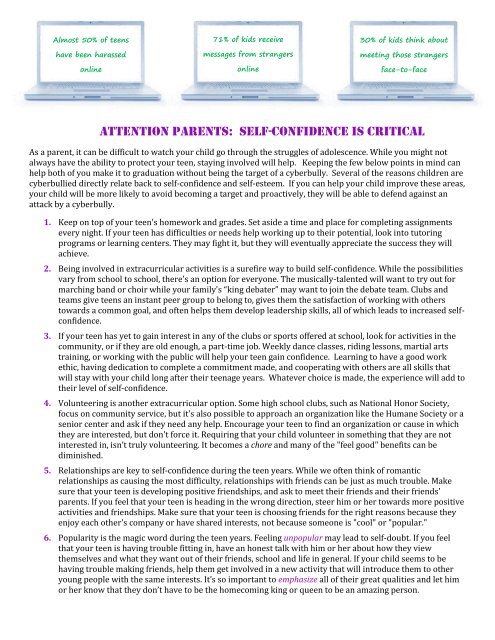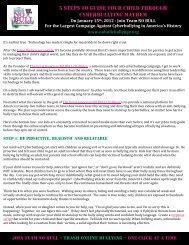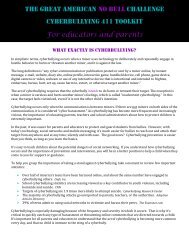The Great American NO BULL Challenge cyberbullying 411 toolkit ...
The Great American NO BULL Challenge cyberbullying 411 toolkit ...
The Great American NO BULL Challenge cyberbullying 411 toolkit ...
Create successful ePaper yourself
Turn your PDF publications into a flip-book with our unique Google optimized e-Paper software.
Almost 50% of teens<br />
have been harassed<br />
online<br />
71% of kids receive<br />
messages from strangers<br />
online<br />
30% of kids think about<br />
meeting those strangers<br />
face-to-face<br />
Attention Parents: Self-Confidence is Critical<br />
As a parent, it can be difficult to watch your child go through the struggles of adolescence. While you might not<br />
always have the ability to protect your teen, staying involved will help. Keeping the few below points in mind can<br />
help both of you make it to graduation without being the target of a cyberbully. Several of the reasons children are<br />
cyberbullied directly relate back to self-confidence and self-esteem. If you can help your child improve these areas,<br />
your child will be more likely to avoid becoming a target and proactively, they will be able to defend against an<br />
attack by a cyberbully.<br />
1. Keep on top of your teen's homework and grades. Set aside a time and place for completing assignments<br />
every night. If your teen has difficulties or needs help working up to their potential, look into tutoring<br />
programs or learning centers. <strong>The</strong>y may fight it, but they will eventually appreciate the success they will<br />
achieve.<br />
2. Being involved in extracurricular activities is a surefire way to build self-confidence. While the possibilities<br />
vary from school to school, there's an option for everyone. <strong>The</strong> musically-talented will want to try out for<br />
marching band or choir while your family's “king debater” may want to join the debate team. Clubs and<br />
teams give teens an instant peer group to belong to, gives them the satisfaction of working with others<br />
towards a common goal, and often helps them develop leadership skills, all of which leads to increased selfconfidence.<br />
3. If your teen has yet to gain interest in any of the clubs or sports offered at school, look for activities in the<br />
community, or if they are old enough, a part-time job. Weekly dance classes, riding lessons, martial arts<br />
training, or working with the public will help your teen gain confidence. Learning to have a good work<br />
ethic, having dedication to complete a commitment made, and cooperating with others are all skills that<br />
will stay with your child long after their teenage years. Whatever choice is made, the experience will add to<br />
their level of self-confidence.<br />
4. Volunteering is another extracurricular option. Some high school clubs, such as National Honor Society,<br />
focus on community service, but it's also possible to approach an organization like the Humane Society or a<br />
senior center and ask if they need any help. Encourage your teen to find an organization or cause in which<br />
they are interested, but don't force it. Requiring that your child volunteer in something that they are not<br />
interested in, isn’t truly volunteering. It becomes a chore and many of the "feel good" benefits can be<br />
diminished.<br />
5. Relationships are key to self-confidence during the teen years. While we often think of romantic<br />
relationships as causing the most difficulty, relationships with friends can be just as much trouble. Make<br />
sure that your teen is developing positive friendships, and ask to meet their friends and their friends'<br />
parents. If you feel that your teen is heading in the wrong direction, steer him or her towards more positive<br />
activities and friendships. Make sure that your teen is choosing friends for the right reasons because they<br />
enjoy each other's company or have shared interests, not because someone is "cool" or "popular."<br />
6. Popularity is the magic word during the teen years. Feeling unpopular may lead to self-doubt. If you feel<br />
that your teen is having trouble fitting in, have an honest talk with him or her about how they view<br />
themselves and what they want out of their friends, school and life in general. If your child seems to be<br />
having trouble making friends, help them get involved in a new activity that will introduce them to other<br />
young people with the same interests. It’s so important to emphasize all of their great qualities and let him<br />
or her know that they don’t have to be the homecoming king or queen to be an amazing person.








